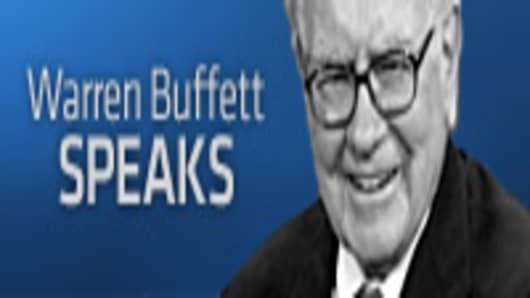BUFFETT: Well, I wasn't thinking specifically of bankers or JPMorgan on that, but I think— I would say that in talking to managers of publicly traded companies, I find— I would say that the great majority of them do not particularly enjoy the interaction with Wall Street. I mean, they do not like the quarterly conference calls and everything. That's not to say they shouldn't do it, but I'm just saying that is a part of their job that if they didn't have it, they would be happier in life. They do not like spending, you know, 15 or 20 percent of the time— I spend no time, for example, with any specific analyst. We spend all the weekend of the annual meeting, you know, we're there to answer questions for hours and hours and hours, and I try to answer all questions that I think are important than I can think of in the annual report. But I have never sat down— I never sit down with a big investor. They write and say, you know, `We own $500 million worth of stock, you have to sit down with us.' And I say, listen, I'm not going to sit down with you. We got, as far as I'm concerned, one share of me owned by some, you know, woman in my neighborhood is just as important as yours. And— but most managements kowtow to large investors. In fact, they call me— some of the things we own, they call me and they want to come from thousands of miles away to talk to me. And I say listen, if I need to talk to you, I shouldn't own your stock. I mean, I don't— I don't need to be schmoozed, you know? I mean— and the investor relations guys hate that because their job is dependent on, you know, making the boss feel it's very important to go around and stroke these big investors. But I'm not looking for that. And I would say that most managements don't enjoy it, and it does spend— they do spend a significant part of time when I would rather have them out there figuring out ways to cut costs or sell more goods or whatever it may be. And our managers do not have to spend any time on that sort of thing.
CARL: So that's more of a— that's just more— it's a function of being public, or having investor relations to deal with, period.
BUFFETT: It's a— yeah, it's a function of succumbing to what investor relations people and Wall Street generally tells you is important. I don't think it's important to schmooze investors. I think in the end you get a class of investors— what you want is people that understand you and your business and what you're about.
JOE: Right.
BUFFETT: And the idea of trying to cultivate new people all the time, you know, there's only so many seats in the church. And at Berkshire, in terms of the A stock, we have a million, 600 and some thousand seats. The only way a guy gets a seat is for somebody else to leave. I'd rather— I'd rather keep the person that's there than to try and induce somebody else to, you know, go out a thousand miles on a trip and tell them, you know, things are wonderful and sort of dodge around the problems of the business. I'd much rather do that than— I'd rather keep the person that's there already, have people that know and understand Berkshire, and not look for a revolving door constituency.
BECKY: Hey, Warren, real quickly, Joe has a question too. But on that point, William Anderson writes in from Salem, Oregon, and he says that, "We often hear that Berkshire shares are undervalued. You indicated that it was painful, comparable to `preparing for a colonoscopy,' to issue Berkshire stock, such as for the purchase of BNSF. With so much money in the bank, why are you opposed to having invest— to investing Berkshire money into a stock buyback and reducing the flow of the Berkshire stock?"
BUFFETT: Yeah, we announced one buyback some years ago when the stock, A stock was down in the low 40,000s. And by announcing, it was self-defeating. I mean, the stock went up. And there are times when I've— would have liked to have bought a significant percentage of Berkshire in the market because I thought it was— it would have been— increased the per-share value of the remaining shares.
If I'm going to buy you out in order to benefit Joe and me, I want to tell you first that I think I'm buying you out cheap. Now, if you still want to sell to me, you know, that's fine and you've been warned and— but the very act of me telling you that, particularly in a stock like Berkshire, is probably going to make the whole exercise self-defeating. It certainly did a couple of years ago. So it isn't much of a tool for us. I think it's a great thing to do if your stock is selling well below intrinsic value. Now, 40 years ago, most buybacks— when Henry Singleton was buying back Teledyne, when Paul Getty was buying back Tidewater Oil, all of those stocks, they were buying them because they were cheap. They were buying dollar bills for 60 cents. I would say that my experience with managements in the last 20 years is that they like buying their stocks when they're high. They, you know, just look at the buybacks that took place in 2006 and 2007 and then look at what those companies were doing in 2008 and '9. They were not buying back their stocks at a small fraction of what they'd been selling for earlier. Managements— many managements just like the idea of having their stocks sell as high as they can, except when they're issuing options to themselves, they like it low then, and the— my attitude is entirely different. You buy your stock back when you think you're buying it for less than it's worth, and you tell the people that you're buying it from that that's the reason you're buying it. If they want to sell it to you, then, you know, both sides benefit.
BECKY: OK. Joe.
JOE: Thanks, Beck. Hey, so Warren, I'm sitting there thinking about, there's more than one way to skin a cat, and I'll get some mail on that, I know, but I think about the way you do things and then, just for an example, I think about Ron Baron, and the way he has— he'll identify something, I don't know how the heck he does it, Apple or Netflix, and then he'll ride that baby and it will turn into like a grand slam. And I don't usually see you buying First Solar or some battery company for lithium cars, I— you know, it's just not your thing. And I wonder whether that's because— I thought about it, if you get a single every time— and you love baseball— if you get a single every time you're up at the plate, you— and you just keep getting singles, you will score more runs than if you get a home run every four or five innings or something. And maybe that's your attitude, but I think about what the government tries to do in picking these home runs, these alternative energy investments, and you don't do it. And I wonder why is it that you do don't do it? You need a real business before you'll put your money down.
BUFFETT: Yeah, I'm not— I'm not smart enough, Joe. I have enough trouble seeing the past; seeing the future's really difficult for me. So I can look at something like Wrigley's chewing gum, you know, which started, I think, around 1892 or something, or Coca-Cola, 1886, and if a product since 1886 has increased its per capita consumption every year for 124 years, almost, I, you know, I can figure that one out. I'm not— I'm not good at picking things for the future. Now, interestingly enough, the one company that you might say I was reasonably good at doing that at was GEICO, where I went there 60 years ago, I've got a 60-year pin here from a month ago. I had it explained to me by a remarkable man when I was 20 years old why GEICO had an extraordinary future, and the basic reasons he explained to me then are still operative today. So that is something, literally, where we have ridden out our own form of Amazon or Netflix or whatever it might be because I understood the reason why they had a fundamental advantage which would last forever. The competitors would not figure out how to take it away from us. But that's a hard thing for me to figure out about some new product. I mean, you know, Becky could show me some instrument she's carrying around that, you know, keeps her in touch...
BECKY: Not me. Maybe Carl.
BUFFETT: Well, maybe Carl, but it keeps her in constant touch with, you know, Carl and you. I'm not sure why she'd want to, but that's another question. The— and— but I won't— I won't under— I won't understand it, you know. But I can understand why people drink Coca-Cola and I can understand why they chew gum and I can understand why they insure with GEICO. And so I am limited by the things I can understand. And I understand things that happened in the past and which ones are likely to repeat and which ones are hula hoops or pet rocks. I can— I can make those decisions reasonably well. I am not good at listening to 20 guys who've got great new ideas about things that are going to change the future...
JOE: Well...
BUFFETT: ...and figuring out which one of the 20 is right.
JOE: But I wasn't headed to a political question, but I just— if you can't do it, that's why I just wonder whether assets are well-spent by a government trying to decide what the next— what's going to power the world 10 or 15 or 20 years from now. That was my point. If you can't do it, why do they think they can do it?




